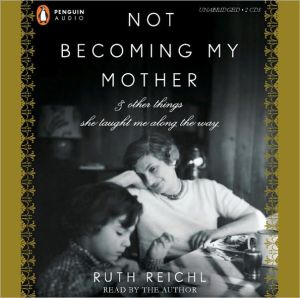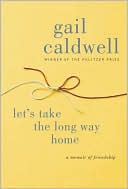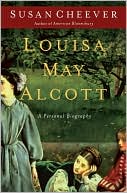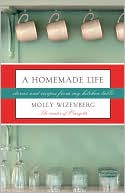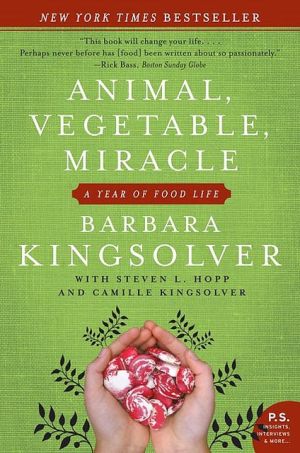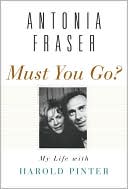Not Becoming My Mother: And Other Things She Taught Me along the Way
Bestselling author Ruth Reichl examines her mother's life, giving voice to the universal unarticulated truth that we are grateful not to be our mothersIn Not Becoming My Mother, bestselling author Ruth Reichl embarks on a clear-eyed, openhearted investigation of her mother's life, piecing together the journey of a woman she comes to realize she never really knew. Looking to her mother's letters and diaries, Reichl confronts the painful transition her mother made from a hopeful young woman to...
Search in google:
Bestselling author Ruth Reichl examines her mother's life, giving voice to the universal unarticulated truth that we are grateful not to be our mothers In Not Becoming My Mother, bestselling author Ruth Reichl embarks on a clear-eyed, openhearted investigation of her mother's life, piecing together the journey of a woman she comes to realize she never really knew. Looking to her mother's letters and diaries, Reichl confronts the painful transition her mother made from a hopeful young woman to an increasingly unhappy older one and realizes the tremendous sacrifices she made to make sure her daughter's life would not be as disappointing as her own. Growing up in Cleveland, Miriam Brudno dreamed of becoming a doctor, like her father. But when she announced this, her parents said, "You're no beauty, and it's too bad you're such an intellectual. But if you become a doctor, no man will ever marry you." Instead, at twenty, Miriam opened a bookstore, a profession everyone agreed was suitably ladylike. She corresponded with authors all over the world, including philosophers such as Bertrand Russell, political figures such as Max Eastman, and novelists such as Christopher Marlowe. It was the happiest time of her life. Nearly thirty when she finally married, she fulfilled expectations, settled down, left her bookstore behind, and started a family. But conformity came at a tremendous cost. With labor-saving devices to aid in household chores, there was simply not enough to do to fill the days. Miriam-and most of her friends-were smart, educated women who were often bored, miserable, and silently rebellious. On what would have been Miriam's one hundredth birthday Reichl opens up her mother's diaries for the first time and encounters a whole new woman. This is a person she had never known. In this intimate study Reichl comes to understand the lessons of rebellion, independence, and self-acceptance that her mother-though unable to guide herself-succeeded in teaching her daughter.
The Mim Tales 9What Girls Can Do 33Finding Mr. Right 45Idle Aptitudes 62Chaos 74What We Are Made For 85Dear Dr. Portnoy 95Rainbows 111Tsunami of Pain 120Grateful 129Gifts 136Acknowledgments 141
\ Publishers WeeklyReichl combs through her dead mother's diaries and correspondence, trying to understand the woman she remembered as bitterly unhappy. She realizes how stifling were the expectations on 1950s housewives and how her mother blamed her depression on her inability to seek meaningful work outside the home. The revelations are fascinating, but Reichl's effort would have been better served by a professional narrator. While her deep, slightly hoarse voice conveys emotion sufficiently, she is an awkward reader, prone to loading her sentences with wooden emphasis and reaching for amateurish dramatic effect. Readers are likely to be struck by her ability to see her mother so clearly and without sentimentality, but they won't lose themselves in the reading. A Penguin Press hardcover (Reviews, Mar. 9). (Apr.)\ Copyright © Reed Business Information, a division of Reed Elsevier Inc. All rights reserved.\ \ \ \ \ Library JournalRestaurant critic Reichl (www.ruthreichl.com), whose three previous memoirs—Tender at the Bone (1998), Comfort Me with Apples (2001), and Garlic and Sapphires (2005)—were all best sellers, here stitches together the account of her mother's unhappy life from letters and notes she discovered after her mother's death. This brief but poignant title underscores the plight of intelligent women forced by societal expectations into leading unfulfilled lives. Although not a trained narrator, Reichl reads with knowing authority. Mothers and daughters interested in learning more about the restrictions placed on women during the mid-20th century as well as appreciators of Reichl's previous books should also enjoy this one. [Audio clip available through us.penguingroup.com; the Penguin Pr. hc, a New York Times best seller, received a starred review, Xpress Reviews, LJ 4/24/09.—Ed.]—Nancy R. Ives, SUNY at Geneseo\ \ \ The Barnes & Noble ReviewAm I imagining it, or does Ruth Reichl's mother resemble Betty Friedan? In the photograph on the cover of this slender, touching portrait, Miriam Reichl appears to have the same heavy-lidded eyes and prominent nose as the feminist icon. But the comparison may have occurred to me because Miriam's disappointing life evokes Friedan's landmark work, The Feminine Mystique: "As she made the beds, shopped for groceries, matched slipcover material, ate peanut butter sandwiches with her children, chauffeured Cub Scouts and Brownies, lay beside her husband at night," wrote Friedan, ?she was afraid to ask even of herself the silent question -- Is this all?? Reichl's book -- which grew out of an arresting award-acceptance speech in which she credited her mother as ?a great example of everything I didn't want to be? -- attempts to trace how far Miriam's life really reflected Friedan's portrait. She employs a treasure trove of letters and musings that Miriam had scribbled on scrap paper throughout her life and preserved in a box. Much of what her daughter found was surely painful to read: Miriam's ambitions to be a doctor were thwarted by controlling parents, who were obsessed with marrying off the daughter they thought of as "homely." The lessons Reichl draws from her mother's misery -- among them that a worklife is "the key to happiness" -- cut right to the heart of the thorny conflicts that have vexed modern feminism. More and more educated mothers defend their decision to stay home, while working-class women have long had no choice but to occupy jobs that could hardly be called "the key to happiness." But this short, powerful book offers an up-close look at an experience common to many women of Miriam's generation, and it is as brave for Reichl to get to know this new mother as it is heartbreaking that she didn't do so until years after her death. --Barbara Spindel\ \
